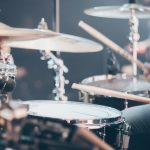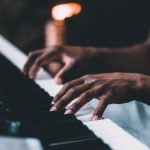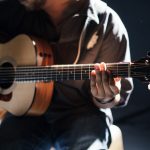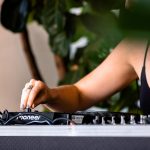Are you a drummer dedicated to your craft but concerned about the impact of loud noises on your hearing?
If so, you’re not alone. As a drummer, it is essential to protect hearing, and failure to do so can lead to permanent damage and hearing loss, impacting your ability to play and enjoy music forever.
In this blog post, we will discuss everything you need to know about hearing protection for drummers. We’ll explore the risks of noise-induced hearing loss, the various types of ear protection available, and the best practices for maintaining healthy hearing habits.
We’ll also provide additional resources to help you learn more about this vital topic. If you’re a drummer, this post is a must-read to help maintain hearing health and keep playing your beloved instrument for years to come.
Drummers should wear hearing protection to prevent noise-induced hearing loss, which can occur due to prolonged exposure to loud noise. Drumming produces high levels of sound that can damage sensitive hair cells in the ear, leading to hearing damage and tinnitus. Using ear protection can significantly reduce the risk of hearing loss, allowing drummers to continue enjoying music-making without compromising their hearing health.
Facts and statistics about hearing loss for drummers:
- According to the American Speech-Language-Hearing Association (ASHA), musicians who play drums are at high risk of developing hearing loss due to prolonged exposure to high levels of sound. Source: https://www.asha.org/Articles/Loud-Music-Dangers-to-Hearing/
- A study from the University of São Paulo found that drummers developed the highest hearing thresholds compared to other types of musicians. Source: https://www.ncbi.nlm.nih.gov/pmc/articles/PMC6998561/
- According to the World Health Organization (WHO), more than 1.1 billion young people worldwide are at risk of hearing loss due to exposure to loud noise, including from music. Source: https://www.who.int/deafness/world-hearing-day/2015/en/
- A study published in the International Journal of Audiology found that musicians, including drummers, who did not use ear protection had higher hearing thresholds and poorer speech recognition than those who used ear protection. Source: https://www.tandfonline.com/doi/full/10.1080/14992027.2018.1427299
- The Occupational Safety and Health Administration (OSHA) recommends that workers limit their noise exposure to no more than 85 decibels (dB) for an 8-hour workday to prevent hearing loss. However, studies show that drumming can produce sound levels of up to 120 dB. Source: https://www.osha.gov/laws-regs/regulations/standardnumber/1910/1910.95
A Deafening Silence
As a drummer, you know that your craft requires precision, creativity, and an ear for rhythm.
Unfortunately, it also requires exposure to high decibel levels that can cause permanent hearing damage.
In this section, we will explore the backstory of a drummer who struggled with hearing loss, examine the impact of hearing damage on drummers, and provide a brief history of noise-induced hearing loss.
The Backstory of a Drummer and Hearing Loss:
Imagine you’re a talented drummer with passion and commitment to your craft.
You’ve played in countless bands and have made music your life’s passion.
But after years of playing with little to no ear protection, you start to notice a ringing sound in your ears, also known as tinnitus.
This sound eventually becomes a noisy distraction, interfering with your ability to hear music at its full potential. Then, as the ringing progresses to buzzing and humming, it becomes difficult to hear even simple conversation.
This is the reality for many drummers who, like you, are exposed to high decibel levels for prolonged periods, usually without ear protection.
Unfortunately, many do not realize the harm they are causing to their hearing until symptoms start to occur, like ringing in the ears, muffled hearing, and eventual hearing loss.
The Impact of Hearing Damage on Drummers:
Hearing damage can have a significant effect on the lives of drummers.
In addition to making it difficult to play music, it can cause them to lose focus, struggle with the complexities of syncopation, and ultimately impair their abilities.
It can also limit their opportunities to work in band performances, as they are unable to compete with other musicians. Additionally, it can have a significant impact on their overall quality of life, both personally and professionally.
A Brief History of Noise-Induced Hearing Loss:
The issue of hearing loss is not a new one.
In fact, it can be traced back to ancient times, where it was commonly caused by loud noises such as drums, bells, and war cries. As time passed, technology advanced, and noise levels have increased.
In recent times, it has become a growing concern for musicians and other professionals in noisy work environments.
In the next section, we will explore the mechanics of hearing and provide an understanding of causes, types, and implications of hearing loss for drummers.
Understanding Hearing Loss
As a drummer, you need to understand how hearing damage occurs and the impact it can have on your life.
In this section, we will dive deeper into the mechanics of hearing, causes of hearing loss for drummers, and the types of hearing loss that can occur.
The Mechanics of Hearing Explained:
Sound waves travel through the air and enter your ear canal, causing tiny hairs in the inner ear to vibrate.
These vibrating hairs then produce electrical signals that are sent to your brain, where they are interpreted as sounds. However, when we are exposed to loud sounds for extended periods, those hairs can become damaged, causing permanent hearing loss.
Causes of Hearing Loss for Drummers:
Drummers are particularly susceptible to hearing loss due to the high decibel levels generated by their instruments.
The cymbals, snare drums, and bass drums can all produce sound levels exceeding 100 decibels— levels that can damage hearing after just a few minutes of exposure.
In addition to the inherent dangers of your instrument of choice, other factors can contribute to hearing damage.
For example, playing music in small, enclosed spaces can amplify the sound further, as can playing with inadequate soundproofing or amplification equipment.
Types of Hearing Loss and What They Mean:
Hearing loss can manifest in different ways, and the severity can vary depending on the circumstances. The three primary types of hearing loss include conductive hearing loss, sensorineural hearing loss, and mixed hearing loss.
Conductive hearing loss occurs when sound waves are blocked from entering the inner ear due to an obstruction such as earwax build-up or damage to the ear canal. It is often reversible with medical treatment.
Sensorineural hearing loss results from damage to the hair cells in the inner ear caused by loud noise exposure. This type of hearing loss is typically irreversible and can worsen with continued exposure.
Mixed hearing loss results from a combination of conductive hearing loss and sensorineural hearing loss. It is relatively rare but can be challenging to treat.
In conclusion, understanding the mechanics of your ears, the causes of hearing loss, and types of hearing loss can help you make informed decisions about protecting your hearing.
In the next section, we will explore why ear protection is crucial for drummers and the types of ear protection available.
The Importance of Ear Protection
Drumming is an enjoyable and creative activity. However, it is also an activity with a considerable risk of hearing damage.
In this section, we will explore why ear protection is crucial for drummers and the types of ear protection available to help you prevent hearing loss.
Why Ear Protection is Crucial for Drummers:
The human ear is an incredibly delicate organ, and once it becomes damaged, it cannot be repaired.
Unfortunately, drummers are at high risk of developing noise-induced hearing loss due to the high decibel levels their instruments produce.
Prolonged exposure to high sounds levels can cause damage to the hair cells in your inner ear that detect sound and convert it to electrical signals sent to the brain. This sensory damage could lead to tinnitus and even complete hearing loss.
Ear protection can prevent the damage from prolonged exposure to loud sounds.
It provides a physical barrier between your ear and the drumkit, attenuating the sound pressure levels reaching your inner ear while still allowing you to hear the other musicians. Wearing ear protection is essential for preventing hearing damage.
Types of Ear Protection Available:
There are different types of ear protection you can choose from to safeguard your hearing. Some of these include:
- Ear Plugs: Earplugs are the most popular hearing protection for drummers because they’re relatively inexpensive and easy to use. These come in different shapes and sizes, and some models are specifically designed for musicians and offer varying levels of sound attenuation.
- Ear Muffs: Ear muffs are a more robust form of hearing protection. They consist of a headband and two cups containing sound-damping material that covers your outer ear. They offer higher noise attenuation levels than earplugs and are suitable for drumming in cramped, noisy environments.
- Custom-Made Ear Protection: Custom ear protection is the best option for serious drummers. The ear molds are made to fit each individual’s ear canal, providing the highest level of comfort and protection. Although custom made earplugs are initially expensive, they are durable and can provide a higher level of protection long term.
Benefits of Wearing Ear Protection:
Not only do earplugs and ear muffs reduce the risk of hearing damage, but they also offer additional benefits for drummers.
For instance, with time they become almost second nature and very comfortable to wear, allowing drummers to concentrate and play with more precision and instinct.
Ear protection helps you maintain appropriate levels of awareness without impairing your ability to play.
Ear protection is crucial to preventing hearing damage for drummers.
Understanding the risks, choices of ear protection available, and the benefits of using ear protection will help you pick the right protection solution for you.
In the next section, we’ll explore custom fit ear protection and the benefits they offer for drummers.
Custom Fit Ear Protection
When it comes to ear protection, custom-fit earplugs are the ultimate way to ensure the highest level of protection, comfort, and suitability for the user.
In this section, we will explore what custom fit ear protection is, the benefits of custom ear protection for drummers, and the process of getting custom ear protection.
What is Custom Fit Ear Protection?
Custom fit earplugs are molded to fit the specific contours of your ear, providing superior noise attenuation, comfort, and stability, resulting in a long-lasting and comfortable solution.
Each plug is designed to fit your individual ear shape, ensuring that no external noise can penetrate your ear canals.
Benefits of Custom Fit Ear Protection for Drummers:
For drummers, custom-fit ear protection has several benefits over other types of ear protection, including:
- Superior Noise Attenuation: Custom earplugs are designed to provide higher levels of noise attenuation than conventional earplugs or ear muffs. That means you will experience the best possible protection for your hearing.
- Comfort: Since custom fit earplugs are molded to fit your ears, they are comfortable to wear. Unlike other types of earplugs, they don’t put any pressure on the ear canal.
- Durability: Custom earplugs are made of high-quality materials that are designed to last for a long time. Because they are made to fit only you, there is less likelihood of losing or misplacing them.
The Process of Getting Custom Fit Ear Protection:
A specialist will take a mold of your ear canal to create a unique impression of its shape and size.
From this, they create a custom mold of earplugs that are designed specifically for your ears.
These molds will be sent to be created at a professional molding facility. Once they’re finished, you will be notified to come in for fitting and testing of the earplugs.
The fitting process will allow the specialist to ensure that the earplugs fit snugly and comfortably into your ear canal and that they provide an appropriate level of noise attenuation, without compromising your audio experience.
Custom fit ear protection is the best way to safeguard your hearing as a drummer.
They offer superior noise attenuation and are extremely comfortable to wear.
Though custom-fit earplugs may be initially expensive, they are worth the investment in the long run and offer so much more than regular earplugs or muffs.
In the next section, we will explore the top ear protection products for drummers and how you can choose the best solution for your needs.
Top Ear Protection Products for Drummers
Choosing the right ear protection solution can be challenging with so many options available.
In this section, we will explore the best ear protection products for drummers, comparing earplugs, ear muffs, and custom options. We will also provide testimonials from drummers who have used different types of ear protection.
Ear Plugs
Earplugs are the most popular type of ear protection for drummers and are available in different materials, sizes, and noise attenuation levels. Here are some of the best earplug options for drummers:
- Eargasm High Fidelity Earplugs: These are designed explicitly for musicians and have an average noise attenuation of 21dB. They come with a small aluminum case that can fit in your pocket and keep them clean between uses.
- Etymotic Research Music Pro Earplugs: These earplugs have an electronic system that adjusts sound automatically, allowing musicians to hear music accurately at lower volumes while still protecting their ears. This technology sets them apart from other earplugs, and though they are more expensive than other earplug options, their quality justifies the cost.
Ear Muffs
Ear muffs offer a higher level of protection than earplugs and are ideal for drumming in environments where you need maximum noise attenuation. Here are some of the best ear muff options for drummers:
- 3M Peltor X5A Over-the-Head Ear Muffs: These ear muffs offer a noise reduction rating (NRR) of 31dB, making them ideal for drumming in loud environments. The over-the-head design and soft cushioned ear cups are extremely comfortable, even during extended use.
- Walker’s Razor Slim Passive Earmuffs: With an NRR of 23dB, these earmuffs offer excellent noise reduction levels, and its slim design makes it a great choice for drummers who need low-profile ear muffs. The comfortable fit and quality sound delivery make it an exceptional choice for many drummers.
Custom Ear Protection
Custom ear protection offers the best and most personalized protection available.
They are comfortable, long-lasting, and offer the highest level of noise attenuation suited to your individual needs. Here are some of the best options for custom ear protection for drummers:
- Sensaphonics 3D-U AARO: These custom earplugs have an NRR of up to 25dB, and their design ensures a comfortable and secure fit. They also come with interchangeable inserts, which allow users to adjust the level of attenuation to suit the environment they are drumming in.
- ACS Pro17: These custom earplugs offer an NRR of up to 17dB, making them ideal for most drumming environments. They use a unique filter system which reduces sound level equally across the frequency spectrum, ensuring users can still enjoy the music at safe levels. The custom fit and durable design make them an excellent investment for drummers.
There are many fantastic ear protection options available for drummers, from earplugs and ear muffs to custom ear protection.
Each option has its unique benefits, and the right choice will depend on your individual needs. By investing in ear protection, drummers not only will they protect their hearing, but also can improve the quality of their music making.
Develop Healthy Hearing Habits
Ear protection is critical for drummers, but it’s only one aspect of protecting your hearing.
In this section, we’ll explore healthy hearing habits that drummers can develop to minimize the risk of hearing damage. These habits are based on expert recommendations and guidelines.
- Take Breaks: While drumming, take frequent breaks to give your ears a chance to rest. This will reduce the amount of time your ears are exposed to loud sounds. You can break up practice sessions into smaller, manageable periods, giving your ears a break between bursts of noise.
- Monitor Your Volume: Use sound level meters or apps to monitor the volume you’re exposed to. Experts recommend that drummers stay below 85 decibels for prolonged practice sessions. You can adjust the volume on various pieces of equipment like amplifiers, headphones, and other sound equipment.
- Wear Ear Protection: Protect your ears during all live performances or whenever you’re exposed to loud sounds, even if it’s just casual jamming with friends. Wear earplugs, ear muffs, or custom fit ear protection to prevent damage to your hearing.
- Discourage Bandmates From Raising Their Volume: Speak to other bandmates, such as guitarists, to keep their amplifiers or monitor volumes to an acceptable level, which will not damage your hearing in the long run.
- Visit An Audiologist: Regular visits to an audiologist will help identify any hearing issues early on, helping to keep your hearing in optimal condition. Audiologists are trained professionals who can assess your hearing ability and develop a hearing protection plan tailored to your needs.
- Maintain General Health: Staying healthy can reduce the risk of hearing damage and other health-related issues. Maintaining good physical health and diet, stress levels, and exercising regularly can all help protect your hearing.
Protecting your hearing is essential for drummers to ensure continued success in their musical career and personal wellbeing.
While ear protection is vital, drummers must exercise healthy hearing habits to minimize the risk of hearing damage.
By implementing expert guidelines and recommendations into their lifestyle, drummers can take responsibility for their hearing, and keep it healthy throughout their career.
The Future of Ear Protection
Ear protection has come a long way, but as technology advances, the future of ear protection looks even more promising.
In this section, we’ll explore some of the advancements and innovations that are likely to shape the future of ear protection for drummers and other musicians.
- Smart Ear Protection: Smart earplugs and earmuffs that adjust to the sound levels of the environment will become increasingly prevalent. They amplify the sound of speech, block loud or harmful sounds, and filter noise to provide the best sound quality, regardless of the listening environment.
- Customizable Sound Profiles: Ear protection will feature customizable sound profiles, allowing users to adjust the frequency response of filtered sound to varying levels depending on the environment.
- Improved Hearing Testing: Audiologists are developing new ways to test hearing capability more accurately, speeding up the process of identifying hearing damage. Early detection enables drummers to take preventative action immediately before the damage becomes irreversible.
- Wireless Monitoring: With the advancement of wireless technology, ear protection devices will be wirelessly connected to smartphones or other smart devices, allowing for more precise monitoring and management of sound levels.
- Noise Tracking: Noise tracking and analyzing tools will become available for drummers. These tools will help musicians track the amount of noise they’re exposed to and how it impacts their hearing quality over a while, empowering them to make more informed decisions on when to take breaks or limit exposure levels.
- Improved Materials: There will be new materials, and even more robust and comfortable designs, of ear protection products which will provide better overall hearing safety.
The future holds significant advancements for ear protection, with emerging technologies offering more protection, accurate monitoring, and management of sound levels.
Drummers will have access to more personalized and comfortable ear protection. With these advancements, musicians will be able to perform with greater confidence in their hearing protection, making drumming more enjoyable and less hazardous.
Conclusion and Resources
In conclusion, drumming is a passion that must be accompanied by a highly disciplined attitude towards protecting your hearing.
Every drummer must realize the importance of taking care of their hearing; hence, they must wear custom-made ear protection, take breaks during prolonged drum sessions, monitor volume levels, discourage excessive volume from bandmates, maintain good overall health, and regularly visit an audiologist.
Protecting your ears should be a life-long practice, and drumming is not an exception. With proper techniques and the right choice of ear protection, drummers can prevent noise-induced hearing loss and tinnitus.
For more information on the topic of hearing protection, drummers can visit the website of the American Tinnitus Association, and the renowned Hearing Health Foundation to learn more about the best practices of protecting hearing, and to stay up to date with the latest information on hearing safety.
Remember, ear protection isn’t only for drumming; it extends into other aspects of life, like concerts, loud outdoor events, and other activities that involve high-decibel sound levels.
Therefore, musicians and everyone who frequently involves high sound volumes activities should develop healthy hearing habits. It is never too late to take action to protect your hearing.
Additional references and reading material
- “Healthy Hearing” Guide by Hearing Health Foundation – This comprehensive guide offers information on hearing protection, ear anatomy, types of hearing loss, and more. The guide provides useful tips for musicians, including drummers, on how to prevent hearing damage. Source: https://www.hearinghealthfoundation.org/healthy-hearing-guides
- “Hearing Protection for Musicians” by The Royal National Institute for Deaf People (RNID) – This guide offers practical advice on how musicians can protect their hearing, with various options from custom earplugs and ear muffs to in-ear monitors. Source: https://rnid.org.uk/information-and-support/playing-music/
- “How Musicians Can Protect Their Hearing” by Healthline – This article offers tips for musicians looking to protect their hearing, including information on earplugs, earmuffs, and custom ear protection. It also highlights the importance of hearing testing for musicians. Source: https://www.healthline.com/health/how-musicians-can-protect-their-hearing
- “Preventing Hearing Loss in Musicians” by the American Academy of Otolaryngology-Head and Neck Surgery – This information sheet provides advice for musicians on how to prevent hearing loss, including tips for reducing exposure to noise and using ear protection. Source: https://www.enthealth.org/conditions/preventing-hearing-loss-in-musicians/
- “Hearing Loss and Music” by American Speech-Language-Hearing Association – This resource provides information on the effects of music on hearing and suggests ways for musicians, including drummers, to reduce the risk of hearing damage. Source: https://www.asha.org/public/hearing/Hearing-Loss-and-Music/
YouTube videos related to hearing protection for drummers:
- “Protect Your Hearing: Top Five Tips for Drummers” by Sweetwater – In this video, a Sweetwater gear expert shares practical tips and advice for drummers to protect their hearing with ear protection. He discusses various types of hearing protection, including over-ear muffs, in-ear monitors, and custom earplugs. https://www.youtube.com/watch?v=hL3wZUpv_TA
- “How to Protect Your Hearing as a Drummer” by MusiciansHQ – In this video, MusiciansHQ shares some crucial tips for drummers to care for their hearing, including the use of ear protection, taking breaks during practice sessions, and low-volume drumming. Link: https://www.youtube.com/watch?v=L4kRD8U4dqw
- “EARasers Drummer Earplugs Review” by The Drumming Review – In this video, The Drumming Review offers a review of the EARasers Drummer Earplugs, which are designed specifically for drummers. The video provides practical information on the features and benefits of these earplugs for protecting hearing health. Link: https://www.youtube.com/watch?v=rlDd9J5PFjE
- “Why Drummers Need Ear Protection” by Vic Firth – In this video, renowned drumstick brand Vic Firth explores the importance of ear protection for drummers, highlighting the risks of hearing loss and tinnitus from prolonged exposure to loud noises. Link: https://www.youtube.com/watch?v=G1AtfoD5-3U








